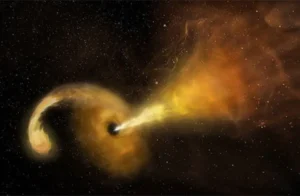Even Russian scientists are saying this is a terrible plan and disagree with Russian space agency Roscosmos chief Dmitry Rogozin’s actions.

The Russian Space Agency has claimed it will confiscate a German telescope placed on a Russian-built spacecraft, after being banned from involvement in a cooperative X-ray telescope project with Germany in the wake of Russia’s invasion of Ukraine.
The Spektrum-Röntgen-Gamma (SRG) space observatory launched in 2019 is an X-ray telescope designed to observe far-off galaxies and supermassive black holes.
Russian space agency Roscosmos partnered with the German space agency, DLR, on the project. Roscosmos was tasked with building and launching the spacecraft, while DLR and Germany’s Max Planck Institute designed the eROSITA primary observational telescope.
The eROSITA telescope’s German developer, the Max Planck Institute, activated the instrument’s sleep mode in February in response to Russia’s aggressive invasion of Ukraine.
Roscosmos chief Dmitry Rogozin, a close ally of Russian President Vladimir Putin, was unhappy with this move and has given orders to restore operations of the telescope without Germany’s permission, according to Deutsche Welle.
“I have been instructed to begin work on restoring the operation of the German telescope in the Spektr-RG system so that it will work in tandem with the Russian telescope,” he said.
“Despite Germany’s demand to close one of the two telescopes at Spektr-RG, Russian specialists insist on continuing its work,” Rogozin said. “Roscosmos will make the relevant decisions in the near future.”
“They — the people who made the decision to close the telescope — have no moral right to stop this search for humanity just because their pro-fascist views are close to our enemies.”
Even Russian scientists are saying this is a terrible plan and disagree with Rogozin’s actions, according to Deutsche Welle, because if Roscosmos succeeds at hijacking the telescope, they might end up damaging the delicate devices inside.
“Our institute, all scientists, strongly object to this proposal,” Lev Zeleny, scientific director of the Russian Academy of Science’s Space Research Institute, said in speaking out against the decision to restart eROSITA.
Our institute, all scientists, strongly object to this proposal
Lev Zeleny
“This is not a Russian device. I don’t presume to judge how realistic this whole epic (with inclusion) is, I don’t know if our specialists have processing codes,” Zeleny said. “But even if they do, it will be simply impossible to publish these data — they will not be accepted” by “a single magazine.”
